- Joined
- Oct 9, 2007
- Messages
- 47,463 (7.50/day)
- Location
- Hyderabad, India
| System Name | RBMK-1000 |
|---|---|
| Processor | AMD Ryzen 7 5700G |
| Motherboard | ASUS ROG Strix B450-E Gaming |
| Cooling | DeepCool Gammax L240 V2 |
| Memory | 2x 8GB G.Skill Sniper X |
| Video Card(s) | Palit GeForce RTX 2080 SUPER GameRock |
| Storage | Western Digital Black NVMe 512GB |
| Display(s) | BenQ 1440p 60 Hz 27-inch |
| Case | Corsair Carbide 100R |
| Audio Device(s) | ASUS SupremeFX S1220A |
| Power Supply | Cooler Master MWE Gold 650W |
| Mouse | ASUS ROG Strix Impact |
| Keyboard | Gamdias Hermes E2 |
| Software | Windows 11 Pro |
Late May 2018, TechPowerUp started a front-page poll asking people which processor they use. 37 days and 16,140 responses later, we have a general idea of where the desktop processor market stands among our readers (predominantly PC gamers and enthusiasts). The top-two responses to our survey were 4th generation Core "Haswell," followed by the preceding two generations ("Ivy Bridge" and "Sandy Bridge"). This speaks volumes as to the hole Intel dug itself into, due to lack of competition from AMD. Processors that are 4-7 years old still run today's gaming PCs, and don't bottleneck today's games, as long as graphics cards keep getting faster (where there has been relatively more competition than the CPU market).
Despite being newer, fewer respondents use 6th generation "Skylake" and 7th generation "Kaby Lake" processors than older generations, because those on something like 4th generation "Haswell" or even "Ivy Bridge," don't see the value in upgrading. But then something changed in 2017 - AMD became competitive again, and forced an increase in CPU core counts across the segment. AMD's Ryzen processor family, including both its 1st and 2nd generations, are better received in the market than Intel's competing 8th generation "Coffee Lake" and 7th generation "Kaby Lake." The data stands to validate the "Ryzen effect," the idea that the introduction of Ryzen disrupted Intel's near-monopoly, increased core-counts, and brought innovation back to the segment.
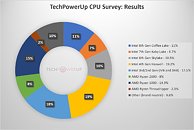
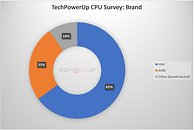
More of our readers use AMD Ryzen processors than Intel Core "Coffee Lake" and "Kaby Lake." So in the period following Intel's launch of 7th generation "Kaby Lake" (slightly before the launch of Ryzen), more AMD processors were installed among our readers. This of course doesn't mean that there are more AMD users, since we're not counting pre-Ryzen Intel generations such as "Skylake" and "Haswell." This seems to suggest that the "Ryzen effect" is not a myth.
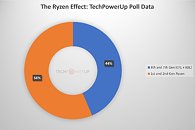
In the time since 2nd generation "Sandy Bridge" (circa 2012), very little innovation has been there from Intel for PC gamers. The mainstream-desktop segment has had to content with no more than 4 cores, and there's been very little IPC increments between generations to warrant upgrades. The result is that there are plenty of people with >4 year old processors, which are fast enough for today's gaming. The data also shows that in a shorter span of time, AMD sold more Ryzen chips.
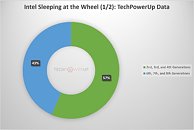
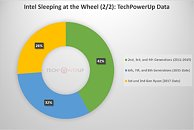
Of course there are limitations to our survey. The data is sourced from a user poll among our readers, in contrast to the Steam Hardware Survey, which gets its data by probing the hardware of a machine. As we mentioned earlier, our readers are composed of PC gamers and enthusiasts, and hence our data isn't in line with the general market (that includes other use-cases).

View at TechPowerUp Main Site
Despite being newer, fewer respondents use 6th generation "Skylake" and 7th generation "Kaby Lake" processors than older generations, because those on something like 4th generation "Haswell" or even "Ivy Bridge," don't see the value in upgrading. But then something changed in 2017 - AMD became competitive again, and forced an increase in CPU core counts across the segment. AMD's Ryzen processor family, including both its 1st and 2nd generations, are better received in the market than Intel's competing 8th generation "Coffee Lake" and 7th generation "Kaby Lake." The data stands to validate the "Ryzen effect," the idea that the introduction of Ryzen disrupted Intel's near-monopoly, increased core-counts, and brought innovation back to the segment.


More of our readers use AMD Ryzen processors than Intel Core "Coffee Lake" and "Kaby Lake." So in the period following Intel's launch of 7th generation "Kaby Lake" (slightly before the launch of Ryzen), more AMD processors were installed among our readers. This of course doesn't mean that there are more AMD users, since we're not counting pre-Ryzen Intel generations such as "Skylake" and "Haswell." This seems to suggest that the "Ryzen effect" is not a myth.

In the time since 2nd generation "Sandy Bridge" (circa 2012), very little innovation has been there from Intel for PC gamers. The mainstream-desktop segment has had to content with no more than 4 cores, and there's been very little IPC increments between generations to warrant upgrades. The result is that there are plenty of people with >4 year old processors, which are fast enough for today's gaming. The data also shows that in a shorter span of time, AMD sold more Ryzen chips.


Of course there are limitations to our survey. The data is sourced from a user poll among our readers, in contrast to the Steam Hardware Survey, which gets its data by probing the hardware of a machine. As we mentioned earlier, our readers are composed of PC gamers and enthusiasts, and hence our data isn't in line with the general market (that includes other use-cases).

View at TechPowerUp Main Site






 Higher clocks and improved IPC would attract more gamers/allround users. I use Ryzen 1700 @ 4 GHz in my server - But for my gaming machine fps drops alot in most games compared to my 6700K @ 5 GHz. Not running games at "ultra" tho, so I'm probably more CPU bound than people usually are. I aim for 120+ fps at all times and with Ryzen I saw way more drops and noticeable lower performance, especially in some of my games.
Higher clocks and improved IPC would attract more gamers/allround users. I use Ryzen 1700 @ 4 GHz in my server - But for my gaming machine fps drops alot in most games compared to my 6700K @ 5 GHz. Not running games at "ultra" tho, so I'm probably more CPU bound than people usually are. I aim for 120+ fps at all times and with Ryzen I saw way more drops and noticeable lower performance, especially in some of my games.
